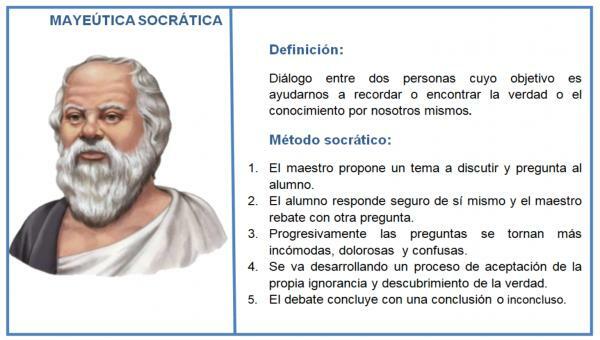Socratic maieutics: definition and characteristics

In this lesson from a TEACHER we will talk on the maieutics or Socratic method, developed by the Greek philosopher Socrates (470-399 BC. C.), one of the fathers of classical philosophy or pre-Socratic philosophy (S. VI-II a. C.). Which is characterized by resort to logos / reason and not to mythos / mythology-religion to explain things. Precisely, Socrates, through maieutics seeks to help find truth or knowledge Through questions that lead us to think, to open our minds, arouse curiosity, incite debate and free ourselves from preconceptions.
It is, therefore, a method that broke in and directly collided with a Predominantly Sophist Athens which established that knowledge was transmitted by the sages to the disciples, whose role was to listen to the teacher. Contrary to what Socrates spread, a method in which teacher and disciple had a dialectical debate from peer to peer.
Thus, maieutics has decisively influenced the history of philosophy and, today, the method Socratic is widely used in psychoanalysis and education, therefore, in a PROFESSOR we are going to explain to you
what is Socratic maieutics and its characteristics.Index
- Who is Socrates?
- Definition: What is Socratic maieutics?
- Characteristics of Socratic maieutics
Who is Socrates?
Socrates was born in Athens around the year 470 a. C. within a humble family (his father was a sculptor and his mother was a midwife), which is why he received a basic education and, before standing out as a philosopher, worked as a bricklayer and fought in the Battle of Potidea (432 BC) C.). However, he also stood out as a disciple of the philosopher Arquelao (S.V a. C.) and, little by little, he excelled as a speaker, creating around him a whole group of disciples like Plato.
Likewise, he also became an uncomfortable character for the tyranny of Critias and in the year 399 a. C. he was sentenced to death for corrupting the youth and for not recognizing the gods. He died at the age of 71 drinking a glass of hemlock, but his legacy did not, because on his death the Socratic school and the platonic academy, reaching us the greatest contributions of him to philosophy: politics, dialectics and maieutics.
Definition: What is Socratic maieutics?
The maieutics or Socratic method, is the method devised by Socrates to help us find and remember the truth. And, for this, the philosopher used the Greek term maieutike= art of helping to give birth, because for him, pregnancy and childbirth were a clear metaphor and analogy of the process that we must follow to obtain knowledge.
For Socrates, knowledge is something inherent to the person that is in us before birth, but at birth it is forgotten and, therefore, to remember it we need someone to help us, since we could fall into the greatest of vices, the ignorance. In this way, the philosopher tells us that we are pregnant with knowledge and that the teacher, like a midwife, helps us to give birth to that knowledge through dialogue.
Also, like childbirth, this process can be painful because it is based on performing a whole series of aporetic and unfinished questions about something that we think we know (love, beauty, friendship, justice ...), but that turn out to be uncomfortable because they show us that we do not have absolute knowledge about what we think understand.
However, this process that a priori turns out to be uncomfortable for one of the interlocutors, it allows us to achieve knowledge by ourselves, helps us reason and open our minds. As Socrates would say: I only know that I know nothing.

Characteristics of Socratic maieutics.
The main feature of Socratic maieutics is the dialectic between two interlocutors that maintain a conservation in which one is limited to asking and the other to answering. Thus, this method is usually divided into two phases:
- The irony: the teacher raises a subject to debate the student, making him believe that he knows it (raising it) and the teacher does not. Thus, the teacher begins by asking in a humble and ironic way and refuting all the answers with more questions.
- The maieutics: it helps us to get our knowledge out of our psyche and to discover that our idea about things is wrong.
Other outstanding features of the Socratic method
Finally, Socratic maieutics will also be characterized by:
- It's about a debate equal to equal and in which both parties have an active role. Here the student will never have a passive role, but participatory.
- In the dialogue, both interlocutors have different roles: the teacher is the one who leads the student to gain knowledge through questions.
- At no time is the teacher going to show his opinion on the issue that is being debated, he limits himself to asking so that the student is able to arrive at the truth through personal or inductive reasoning.
- The purpose of the questions is to question preconceptions and, therefore, they are clear, direct and open questions that do not seek a yes or no.
- The debate that maieutics leads us to does not always have to lead us to a solution or conclusion. Well its true end is to become aware of our own ignorance and, therefore, invite us to question everything and freeing ourselves from closed beliefs or thoughts.

If you want to read more articles similar to Socratic maieutics: definition and characteristics, we recommend that you enter our category of Philosophy.
Bibliography
Antiseri and Reale. History of Philosophy. Vol. 1. Ed. Herder. 2010

